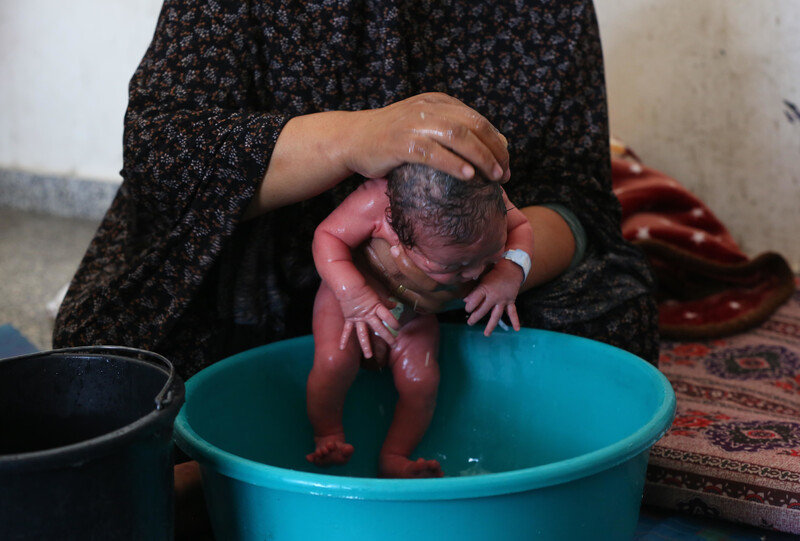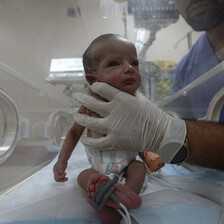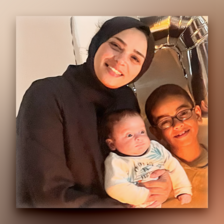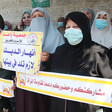The Electronic Intifada 2 April 2024

A woman bathes a one-day old baby at a UN shelter.
APA imagesThe birth of a new baby is usually an occasion for joy.
But under the current conditions of genocide in Gaza, this is simply no longer true.
According to UNICEF, there are 180 births every day in Gaza.
These happen without access to any kind of reasonable healthcare facilities. Israel has destroyed Gaza’s health sector, bombing, damaging or destroying completely 30 out of Gaza’s 36 hospitals, most recently besieging Gaza’s main hospital, al-Shifa, for more than two weeks, killing 400 people, including children, doctors, nurses and patients, in the process.
There are barely any anesthetics or painkillers, which – alongside crutches, maternity kits and even toys – Israel prevents from entry to Gaza as part of its punitive aggression on the people there.
A new birth engenders considerable pain, stress and hardship and is a tremendous strain on mothers and parents generally when the world around you lies in rubble.
Indeed, it is well-established that postpartum depression in times of war and conflict – or from other sources of external stress and friction – spikes significantly.
According to the medical literature, postpartum depression (PPD) – classified as a psychiatric disorder that starts soon after birthing, eliciting neuropsychological and behavioral deficits in mothers and offspring – affects just over 17 percent of mothers globally.
But in wartime, incidences of PPD can double or even triple.
And it is not just the stress of conflict. It is also the lack of aftercare, something simply not available in Gaza today. The severity and duration of postpartum depression increases due to inadequate living conditions, and the inability to provide basic necessities like clothing, milk formula and diapers for the newborn.
Widespread trauma
Throughout the ongoing genocide in Gaza, I have served in different maternity wards across several hospitals including al-Shifa hospital, Nasser Medical Complex and in field hospitals.
In my encounters with new mothers from all over the territory, it was clear that many suffered postpartum depression or suffered the symptoms that would make such a depression all but inevitable.
Baraa lost her husband a month before giving birth. Her only wish after delivering was for him to “be here to see him and share this moment with me.”
Yusra broke down in tears, pleading with her healthcare workers to recite the adhan prayer for her newborn son, because both her husband and her father had been killed.
“Can the pediatrician or anyone else recite the call to prayer in my son’s ear,” Yusra asked.
Traditionally, a child’s father or grandfather recites the prayer over the newborn.
Equally traumatic is the fear of being helpless to care for the baby, a fear exacerbated by the absence of basic necessities like milk and clothing.
One woman kept apologizing because the only clothes she had for her newborn son were pink girls’ clothes repurposed from the boy’s older sister.
Many come to health centers looking for milk or diapers, with little available in the market and prices up tenfold.
Under these extreme circumstances, it’s highly probable that these women will develop depression.
Each mother finds herself incapable of providing for the immediate or future needs of her newborn, placing her in a cycle of despair, anxiety and powerlessness.
During wars, several unfavorable socioeconomic factors significantly increase the risk of PPD pathogenesis. These include poverty and lack of social support, exposure to adverse life events such as anxiety arising from the physical and mental strains of childbirth amidst difficult circumstances, and the inability to form efficacious mother-infant bonding.
PPD not only affects the mother’s health but also has significant implications for offspring. PPD in mothers is often associated with physical changes in their children, such as weight loss, reduced overall physical and social health, as well as cognitive and emotional problems.
Indeed, trauma was already widespread in Gaza before Israel’s latest assault. More than half of all children in Gaza suffered post-traumatic stress disorder, according to a 2020 study, and this mental health crisis is only getting more acute.
And the prevalence of PTSD and PPD will not disappear with the end of conflict.
The importance of an immediate cessation of violence and a huge program of treatment and trauma care cannot be overstated.
Dr. Roba Almadhoun is an obstetrician in Gaza.





